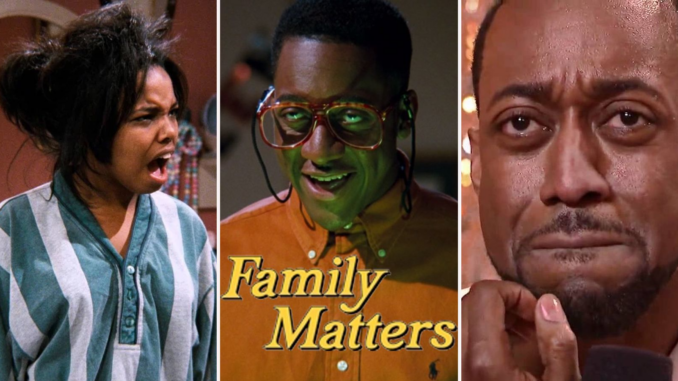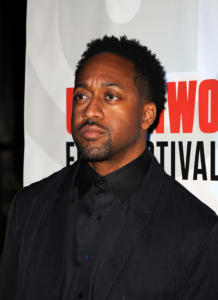
Let’s be honest—when we hear the name Dancing with the Stars, most of us picture glitz, glamor, and feel-good fun. But what if the dance floor isn’t as shiny as it seems?
Actor Jaleel White, who skyrocketed to fame as the quirky Steve Urkel in Family Matters, had a lot to say about his experience on DWTS—and it wasn’t pretty. In a candid reflection shared in his memoir, White peeled back the curtain on his stint with the beloved reality competition. His words weren’t just surprising—they were a full-blown critique of how reality TV sometimes manipulates pain for ratings.
Let’s dig deep into the truth behind the twirls.
Who Is Jaleel White?
Before we hit the ballroom drama, let’s rewind. Jaleel White is best known for portraying the nerdy-yet-lovable Steve Urkel in Family Matters. He became a pop culture icon in the ’90s and carved out a successful career as an actor, voice talent, and now—author.
But fame came with baggage, and as he reveals, his time on Dancing with the Stars opened up some emotional wounds that producers, he says, exploited.
Why Did Jaleel White Join DWTS?
Like many celebrities who take the DWTS stage, White joined the show in 2012 (Season 14) hoping for a fresh chapter. It was a chance to reintroduce himself to America—not as Urkel, but as Jaleel. Dancing seemed like a positive, fun challenge. But as we’ll see, things quickly soured.
A Promising Start That Took a Turn
White was paired with professional dancer Kym Johnson. On-screen, the two looked like a solid team. Off-screen, however, rumors of tension between them spread fast. During rehearsals, there were whispers of heated arguments, including a report of White allegedly yelling at Johnson after she stepped on his foot.
White denied being aggressive, saying the story was blown out of proportion. But in the court of public opinion, the narrative was already out there—and the damage was done.
Behind-the-Scenes Pressure: What Viewers Didn’t See
According to White’s memoir, Dancing with the Stars was far more stressful than he expected. He alleges that producers pressured him emotionally and strategically emphasized storylines that played on his personal struggles, particularly involving his late mother.
He accused producers of “weaponizing” his pain—bringing up his grief to manufacture drama and draw sympathy votes.
Manipulation for Ratings?
This is where things get real. White said the show didn’t just celebrate his journey—it exploited it. In his words, producers weren’t just looking for talent, they were looking for trauma. He believed they deliberately leaned into his emotional vulnerabilities for TV moments that would tug at heartstrings and boost ratings.
It’s a stark accusation that points to a bigger issue with reality TV: when does storytelling cross the line into manipulation?

Mental Health and Reality TV
Let’s pause here. White’s critique isn’t just about bruised egos or bad edits. It taps into a much broader concern—mental health in the entertainment industry.
Contestants on shows like DWTS aren’t just dancing. They’re being judged, watched, and edited in ways they can’t control. When emotions are heightened, especially after the loss of a loved one, it’s easy for producers to build narratives that viewers latch onto—even if the contestant feels exposed or misrepresented.
Did Other Contestants Share Similar Concerns?
White isn’t alone in his discomfort. Over the years, other DWTS contestants—like Mischa Barton and Heather Mills—have hinted at the mental and emotional strain of reality TV production. Although not all were as direct as White, there’s a pattern: what we see on screen may not tell the full story.
Was the Public Too Quick to Judge?
When White had his rumored outburst with Kym Johnson, tabloids ran wild. Few asked about the pressure he was under or whether there was more beneath the surface.
This raises a question: do we as viewers contribute to this cycle? Are we too eager to believe the narrative given to us by producers? It’s something worth thinking about the next time a celebrity “melts down” on national TV.
Jaleel White’s View on His Reputation
In his memoir, White expressed frustration that people are still quick to judge him based on edited moments rather than the full scope of his character. He emphasized that he isn’t the person portrayed in rumors—and that his humanity is often lost behind the curtain of celebrity.
The Power of Editing
Let’s get real: producers can make anyone look like a villain, a hero, or a victim with a few snips in the editing room. White suggests this played a major role in how he was perceived. He believes that behind-the-scenes manipulation influenced how his story was told—and it didn’t align with reality.
So… Did He Regret Doing the Show?
In short: yes. White has stated that if he could go back, he wouldn’t have done Dancing with the Stars. He felt it was marketed as a celebration of celebrity transformation, but in practice, it became a “pain performance.”
Still, he acknowledges the dedication of the professional dancers and doesn’t blame them—but he’s clear about who he feels took advantage of his story: the producers.
Where Is Jaleel White Now?
Despite the rocky experience, Jaleel White didn’t let the DWTS fallout define him. He continues acting, producing, and writing. His memoir, Growing Up Urkel, has opened up deeper conversations about child stardom, fame, and navigating identity in Hollywood.
He’s no longer letting others define his narrative—and that’s something we can all respect.
The Bigger Picture: Should Reality TV Be Held More Accountable?
White’s critique isn’t just a personal rant—it’s a call to action. Should reality shows do more to protect contestants emotionally? Should viewers demand more transparency? If we truly care about mental wellness, then we need to rethink how entertainment is made—and consumed.
Conclusion: Glitter, Drama, and the Price of Fame
Jaleel White’s journey on Dancing with the Stars may have looked graceful on the outside, but behind the scenes, it was a storm of stress, grief, and emotional manipulation. His experience reminds us that reality TV isn’t always real—and the cost of “entertainment” can be higher than we realize.
While he may have danced under the spotlight, White’s voice today shines brighter—because it tells the truth.
FAQs
1. What did Jaleel White say about Dancing with the Stars producers?
He claimed they emotionally manipulated him and exploited his personal pain, particularly surrounding the death of his mother.
2. Did Jaleel White have conflicts with his dance partner?
There were rumors of tension with Kym Johnson, but White denied being aggressive or disrespectful.
3. Did Jaleel White regret joining DWTS?
Yes. He stated that he would not do the show again, calling it emotionally draining and unfairly edited.
4. Is Jaleel White still active in Hollywood?
Absolutely. He continues to work in TV and film and has authored a memoir sharing his experiences.
5. What does his critique say about reality TV culture?
It highlights deeper concerns about emotional manipulation, mental health, and the ethics of “entertainment” that relies on personal trauma.
